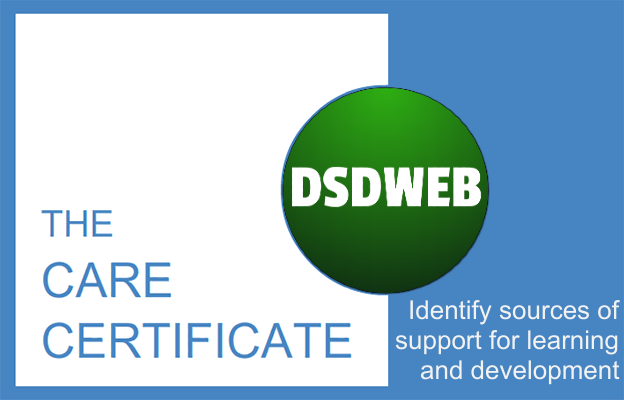This page is designed to answer the following questions:
- 2.1a Identify sources of support for their own learning and development (Care Certificate, Standard 2: Your Personal Development)
- 3.1 Identify sources of support and how they can be used for own learning and development (Level 2 Diploma in Care, Personal development in care settings)
- 4.1 Identify sources of support for planning and reviewing own development (Level 3 Diploma in Adult Care, Promote personal development in care settings)
NOTE: This page has been quality assured for 2023 as per our Quality Assurance policy.
Professional development is an essential part of a health and social care worker’s role. It is important to keep up-to-date with changing legislation and best practices and there is always room to improve. It is prudent to have a good understanding of the sources of support available to help with learning and development.
Manager
Perhaps your best source of support for your own learning and development is your manager. You will have regular supervision and an annual appraisal to discuss any training that you or they think you could benefit from and to discuss your personal development goals.
You should prepare for these meetings by making notes of any issues you have had, any non-urgent concerns (urgent concerns should be reported immediately) and any insights you have had during your reflective practice. Your manager should offer guidance and feedback about how you can improve your practice.
You should also have regular formal observations, where your manager observes you doing a support task.
All formal meetings and observations should be documented and stored in your personnel and training records.
Training & research
Your employer must provide training so that you can work at the minimum standards required for a health and social care worker. This will include the standards covered by the Care Certificate as well as any specialised training that is relevant to your role.
Formal training can either be provided in-house by your employer, or an external agency may be used. You may also undertake other types of training, such as on-the-job training or online courses.
You may also do your own research to learn about topics that you feel you should know more about or think may benefit the services you provide. These days, research is often performed using the Internet, but books can still play an important part.
Team meetings & co-workers
Team meetings are an opportunity for you and your team to learn together. You can share ideas and discuss solutions to common problems.
Your co-workers can also be a source of both formal and informal support by providing feedback or offering advice and guidance.
Feedback from others
As well as obtaining feedback from your colleagues, talking with the individuals you support and other professionals from the care sector can be great sources of information. The individuals that you provide care to or their friends and family will be able to explain to you how your practice impacts them. Other professionals may be able to provide you with information about changes in local policy or training opportunities in your area.
A good example of knowledge-sharing between other professionals is the Registered Managers Network run by Skills for Care – they are free, and you don’t have to be a registered manager to attend, although you should contact the Chairperson first.
Mentors/tutors
For some people, a mentor can be a valuable source of learning. This is someone who is experienced in care work and can give you pointers and advice about your work and how you could do it better. You can also learn from observing them and incorporating their good practice into your own practice. Similarly, if you are enrolled on a course or training program, your tutor/teacher may be able to give you valuable advice.
Policies & procedures
Company policies and procedures can also be great sources of information regarding your own personal development. By reading and understanding them, you are much better equipped to deal with situations in the correct manner, and you can learn a lot about how your organisation and the health and social care sector as a whole work.
Standards
Standards are used to set out the required attitudes, behaviours and competencies of health and social care workers. They will inform your practice and can be used to assess your performance. A list of standards in the health and social care sector can be found here.
Experience
There is no better teacher than experience. By doing your job on a day-to-day basis, you will instinctively learn how to do it effectively and to the best of your ability. It is also useful to reflect on your work to aid your learning and development.
Summary
So, in summary, the main sources of support are:
- Informal and formal conversations with your manager
- Supervisions
- Appraisals
- Observations
- Professional discussions
- Regular training
- Own research
- Standards
- Talking with colleagues
- Talking with professionals
- Team meetings
- Registered Managers Network
- Mentors/tutors
- Company policies and procedures

